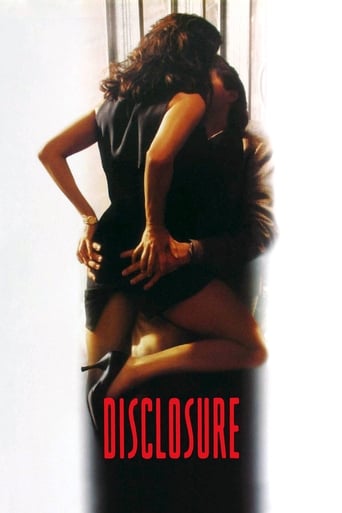

One of the best films i have seen
... View MoreThe film creates a perfect balance between action and depth of basic needs, in the midst of an infertile atmosphere.
... View MoreThe movie's neither hopeful in contrived ways, nor hopeless in different contrived ways. Somehow it manages to be wonderful
... View MoreIt's easily one of the freshest, sharpest and most enjoyable films of this year.
... View MoreSplendid acting from Michael Douglas, Demi Moore and Donald Sutherland save a somewhat complicated and rather computer-technical plot which doesn't make a great deal of sense if we examine it too closely. Another drawback lies in the TV-style direction by Barry Levinson, who was certainly an odd choice for director. The movie was obviously produced on a multi-million dollar budget -- thirty- two million if I remember correctly -- so why hand the reins to someone with a tunnel vision who sees everything in facial close- ups? Even minor characters who are on screen for only a minute or so get the full, stand-alone, close-up treatment. At the end of the day, we have so many unimportant faces that close-ups force us to remember that it's difficult to even keep track of the plot, let alone focus our attention on which characters are important in this never-ending parade of who the dickens is who! Even right at the very end of the movie we are still being urged via distracting close-ups to take special note of newly introduced characters who have virtually little or nothing to do with the plot whatever!
... View MoreBy the specialist of the trendy thriller, this movie rather well pinned also speaks about the difficult square in the society that all those can occupy sometimes who do not enough sit - at least not endowed with varied and diverse protections. What it will be necessary to raise it is that Crichton dodges these long sequences of court with strong theatrical echo which we undergo very often among soaps in the TV (and also in John Grisham's books and in adventures of the TV show Ally Mc Beal), instead of it he joins in the life the office among this great number of "small" details that all those sometimes forget who do not work: another tour de force very rich in teaching...Because freedom is also a question of money although people are not globally more free than before in the old time, it is simply wrong!! Careful thus in "politically correct" falsified, in the traps, in the blackmail, in the propaganda, in the jealousy...
... View MoreDisclosure is a thriller directed by Barry Levinson that stars Michael Douglas and Demi Moore. It is based on Michael Crichton's novel of the same title.The cast also includes Donald Sutherland, Rosemary Forsyth and Dennis Miller.The film is a combination mystery and thriller about office politics and intrigue in the computer industry in the mid-1990s. Also,it includes the issue of sexual harassment.Tom Sanders is an executive at DigiCom, a leading computer software firm. The company is about to launch a new virtual reality-based data storage system that is expected to revolutionize the industry, and Bob Garvin, the owner of the company, is in the midst of negotiating a merger that could bring $100 million into the firm. However, while Tom is expecting a promotion, he discovers the position has been given instead to a new hire, Meredith Johnson, with whom Tom had an affair years ago, before he was married. After her first day of work, Meredith invites Tom up to her office and makes a concerted attempt to seduce him; while Tom doesn't fight off her advances with very much gusto at first, eventually he decides things have gone too far and leaves in a huff. The next morning, Meredith accuses Tom of sexual harassment, and he realizes this was merely a power ploy to get him out of DigiCom for good; Tom, determined to fight, files a counter-suit, which makes him no friends at the company, since rocking the boat too hard could very well scotch the merger.The story takes some clever twists and turns as it develops into a full- fledged psychological thriller that is effective and gripping, if occasionally contrived as a result of over-plotting.The film is genuinely gripping and well-written.As for the performances,Moore makes an awesome femme fatale while Douglas triumps over evil in a big way.But it is a watchable film as well.
... View MoreThis movie was very well filmed in the form of a mystery. It begins by raising the issue of whether men can be sexually harassed and it was advertised this way. The movie also raises the question about sex discrimination in the work place and sexual politics, which centers around a promotion.Another issue permeates the entire movie from the very start and continues right to the end, in the form of technical talk that I, like most viewers wanted to ignore. After all, there are far more important things to consider here, like whether a man can be sexually harassed and are women discriminated against in the workplace. Who wants to think about the problems with the CD Rom Disk Drives for Archamax? When the mystery is revealed in the end, we find out who really knows what is going on, it leaves the viewer with a satisfied feeling. Of course, at this point all is forgiven for one of the characters, the bad person gets their just desserts, justice is served all around, and then we hear the inspiring music and we get a chance to feel good.
... View More